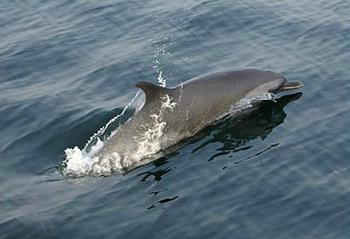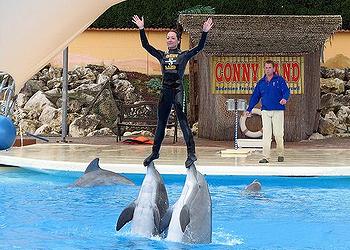Good news finally! I am afraid that this good news isn't coming from Langkawi. This comes from our neighboring continent, India!
I have been hearing stories about a dolphinarium to be set up in Langkawi. How true this is, I am uncertain. However, I am praying hard that this will not become a reality. Visitors can have opportunities to see wild dolphins in the coast of Langkawi (depending on your luck) when they take up island hopping or mangroves boat tours.
NEW DELHI, India, May 20, 2013 (ENS) – India’s Ministry of Environment and Forests has decided to forbid the keeping of captive dolphins for public entertainment anywhere in the country.
In a policy statement released Friday, the ministry advised state governments to reject any proposal to establish a dolphinarium “by any person / persons, organizations, government agencies, private or public enterprises that involves import, capture of cetacean species to establish for commercial entertainment, private or public exhibition and interaction purposes whatsoever.”
The statement issued by B.S. Bonal, the member secretary of the Central Zoo Authority of India, acknowledges that cetaceans in general do not survive well in captivity, saying, “Confinement in captivity can seriously compromise the welfare and survival of all types of cetaceans by altering their behaviour and causing extreme distress.”
Noting that India’s national aquatic animal, the Ganges River dolphin, as well as the snubfin dolphin are listed in Schedule-I and all cetacean species are listed in Schedule II part I of the Wild Life (Protection) Act, 1972, the ministry said it is important to protect these endangered species from captivity and exploitation.
“Whereas cetaceans in general are highly intelligent and sensitive, and various scientists who have researched dolphin behavior have suggested that the unusually high intelligence; as compared to other animals means that dolphin should be seen as ‘non-human persons’ and as such should have their own specific rights and is morally unacceptable to keep them captive for entertainment purpose,” the ministry said.
The grassroots Federation of Indian Animal Protection Organization, FIAPO, was pleased with the decision. This group took the lead in campaigning to ban dolphinaria in India, meeting with key ministry officials and garnering local grassroots support.
FIAPO spokesperson Puja Mitra called the decision “a huge victory for the dolphins!”
“India has become a beacon of hope for the global movement to protect cetaceans from captivity, and we thank Minister Jayanthi Natarajan for setting the benchmark in animal protection for the world,” Mitra said.
FIAPO has been working with their partners Born Free Foundation, Global Green Grants Fund, Earth Island Institute’s Dolphin Project and Wildlife Rescue and Rehabilitation to bring about this prohibition in India for the past year.
Ric O’Barry, a former dolphin trainer who now serves as director of the U.S.-based Earth Island Institute’s Dolphin Project, applauded India’s new policy.
“This is a huge win for dolphins,” said O’Barry. Not only has the Indian government spoken out against cruelty, they have contributed to an emerging and vital dialogue about the ways we think about dolphins – as thinking, feeling beings rather than pieces of property to make money off of.”








No comments:
Post a Comment